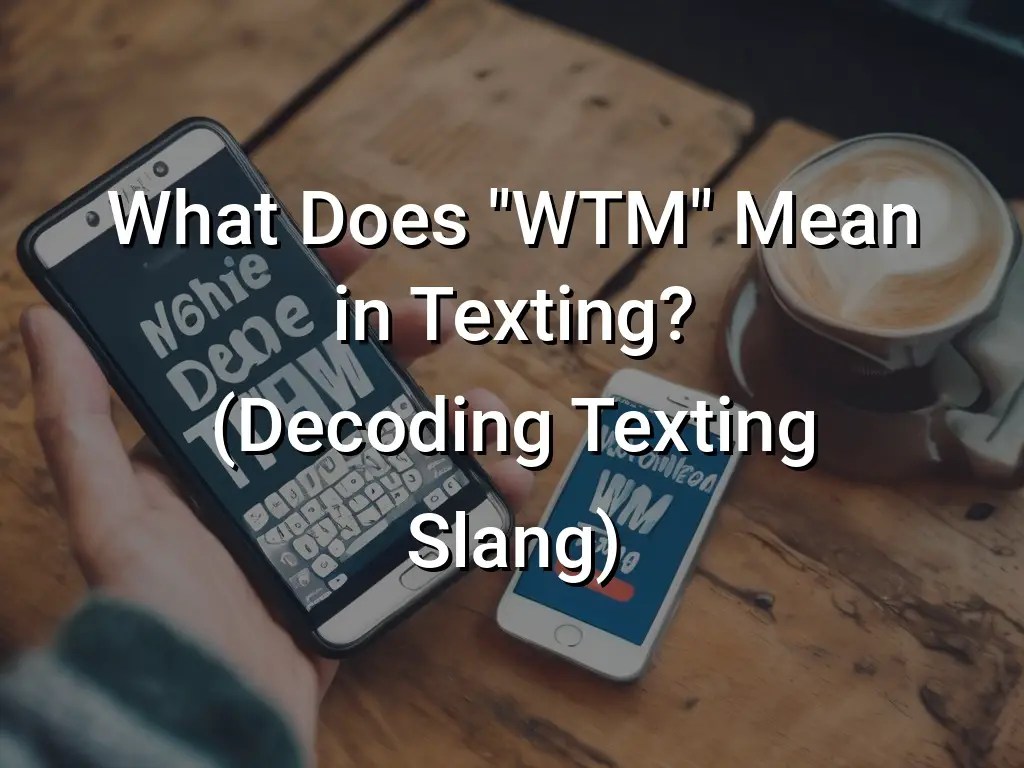What Does WTM Mean In Texting? Understanding The Acronym In Modern Communication
In the age of digital communication, acronyms and shorthand have become a significant part of our texting language. One such acronym that you might come across frequently is WTM. So, what does WTM mean in texting? This article will delve deep into the meaning of WTM, its origins, usage, and the contexts in which it is most commonly used. As we explore this texting shorthand, you will gain a comprehensive understanding of how it fits into everyday conversations and its relevance in modern communication.
With the rise of social media platforms and instant messaging apps, individuals have started to seek quicker ways to communicate their thoughts and feelings. Acronyms like WTM serve as linguistic shortcuts that save time and space while texting. However, understanding these abbreviations is crucial for effective communication, especially in a world where misinterpretations can easily occur.
In this article, we will not only clarify the meaning of WTM but also provide examples, variations, and tips on how to use it appropriately. We will also look at other similar acronyms and their significance in texting culture. By the end, you will be equipped with the knowledge to navigate conversations that include WTM and similar terms.
Table of Contents
- What is WTM?
- Origin and History of WTM
- How WTM is Used in Texting
- Examples of WTM in Text Conversations
- Similar Acronyms and Their Meanings
- The Importance of Understanding Acronyms
- Contextual Usage of WTM
- Conclusion
What is WTM?
WTM is an acronym that stands for "What's the Move?" It is primarily used in texting and online communication to inquire about plans, actions, or the next steps in a given situation. The phrase conveys a sense of anticipation or urgency, often used among friends or acquaintances when discussing upcoming events or activities.
Common Contexts for WTM
WTM is typically used in casual conversations where the speaker is looking for clarity or direction. Here are some common contexts in which WTM might be used:
- Planning a social gathering or outing.
- Discussing potential activities during a day off.
- Inquiring about the next steps in a project or collaboration.
Origin and History of WTM
The acronym WTM emerged alongside the rapid evolution of digital communication, particularly with the rise of texting and social media platforms. As people sought more efficient ways to communicate, abbreviations became increasingly popular. WTM likely gained traction in the early 2000s, following the widespread adoption of texting among younger demographics.
How WTM is Used in Texting
Using WTM in texts is straightforward, but it's essential to use it appropriately to convey the intended meaning. Here are some tips on how to incorporate WTM into your texts:
- Use it to initiate conversations about plans: For example, "WTM this weekend?"
- Respond to someone asking about your availability: "I'm free Saturday, WTM?"
- In group chats, use WTM to gauge interest in activities: "WTM for dinner tonight?"
Examples of WTM in Text Conversations
Understanding how WTM fits into real conversations can enhance your comprehension of its usage. Here are a few examples:
- Friend 1: "Hey, are you free tomorrow?"
- Friend 2: "Yeah, WTM?"
- Friend 1: "Thinking of hitting the new cafe."
In this exchange, Friend 2 uses WTM to express their willingness to make plans without being specific, allowing Friend 1 to provide the next steps.
Similar Acronyms and Their Meanings
In addition to WTM, several other acronyms are commonly used in texting. Here are a few:
- WYD: What You Doing?
- TBH: To Be Honest
- SMH: Shaking My Head
- LOL: Laughing Out Loud
Each of these acronyms serves a unique purpose in texting, and understanding them can help improve communication skills.
The Importance of Understanding Acronyms
As texting culture evolves, understanding acronyms like WTM is vital for effective communication. Misunderstanding these terms can lead to confusion or misinterpretation of messages. Here are some reasons why it's essential to grasp these shorthand phrases:
- Enhances clarity in conversations.
- Helps avoid potential miscommunications.
- Facilitates quicker and more efficient exchanges.
Contextual Usage of WTM
While WTM is primarily used in casual settings, it's crucial to consider the context of the conversation. Using WTM in professional communication may not be appropriate, as it may come off as too informal. Here are some tips for using WTM in various contexts:
- In casual settings, feel free to use WTM liberally.
- In professional settings, consider your audience before using acronyms.
- When in doubt, opt for a more formal approach to avoid misunderstandings.
Conclusion
In summary, WTM stands for "What's the Move?" and is a valuable acronym in the modern texting vocabulary. Its usage spans various contexts, primarily in casual conversations among friends or acquaintances. Understanding WTM and similar acronyms enhances communication and helps avoid confusion.
Now that you are equipped with the knowledge of what WTM means in texting, try incorporating it into your conversations. Don’t hesitate to leave a comment below sharing your experiences or any questions you may have. Also, feel free to share this article with friends who might benefit from understanding texting acronyms better.
Final Thoughts
The world of texting is constantly evolving, and staying updated on the latest trends and acronyms is essential. We hope you found this article informative and engaging. Be sure to visit our site for more insights into digital communication and language trends. We look forward to seeing you again!
Article Recommendations
- Marjorie Elaine Harvey
- Bolly4u
- Akira Nakai Family
- Barron Trump Height Disease
- David And Rebecca Muir Wedding
- Simon Cowell Funeral
- Scheels Black Friday Ad
- Scheels Black Friday 2024
- Homer James Jigme Gere
- Emily Compagno Husband


